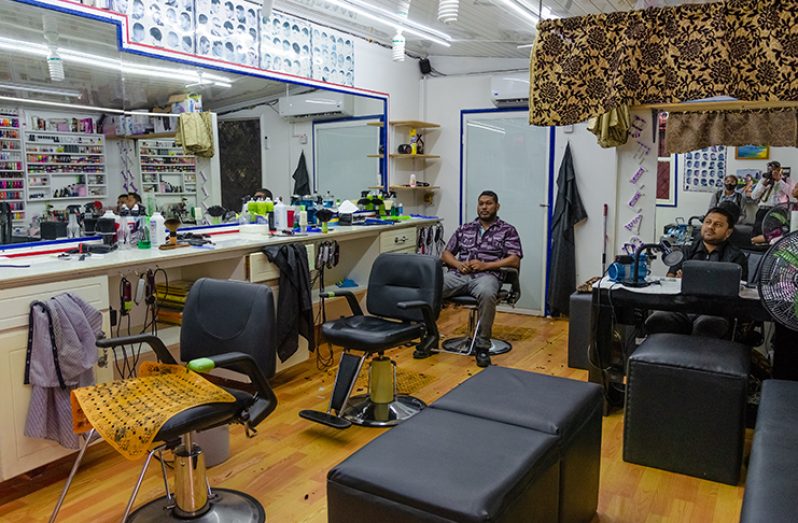ON a normal day, the “blue shop” located in Sixth Street Cummings Lodge is one of the go-to spots for a hearty, budget-friendly home-cooked meal. Random queues of people would surround the small snackette, impatiently attempting to make a quick purchase of chicken curry or rice and bora. But, business has not been normal, at least not since March.
The close proximity of the snackette to the entrances of the University of Guyana (UG) and the Cyril Potter College of Education (CPCE) allows the business to attract the “target population” effectively. In March, when Guyana detected its first case of the novel coronavirus (COVID-19), schools were forced to close in order to mitigate the spread of the virus, inevitably causing the target market to disappear.
“If we used to sell 100 boxes of food a day, now is about half we does make,” Regina (only name given), one of the two cooks in the snackette said, adding: “We make less food now cause if you make more you might have to give it away or throw it away.”

If you peer through the glass case at the front of the snackette, it is evident that there are smaller portions of food on display. Usually, that would be due to a steady stream of purchases, but that was not the reason on an average pandemic Monday (which is just another seemingly mundane day), when the Guyana Chronicle visited the snackette.
The blue shop, which is actually called Sherry’s snackette, mirrors the general business atmosphere in this university area- monotonous. Regina explained that there might be some rush at lunchtime; after all, the blue shop’s reputation precedes itself. Beyond that, the customers are “near and far”.
At the intersection of Sixth Street and UG Road, there is a double complex: an eatery on one side and a printer on the other. As you enter the eatery, there is a sink set up to wash your hands and a few tables inviting you to sit and enjoy a creole lunch or any of Guyana’s beloved street foods. At lunchtime, no one is there eating though. The only customer that eventually comes by is a man searching for a cold beverage.
Maduraj Mohan, the son of the proprietor, told the Guyana Chronicle that business has been reduced by nearly 60 per cent. Quantifying this, he related that normally, the shop would sell 30 Dhal puris and more than 20 egg balls daily; however, since the pandemic, this number has been reduced to about 15 puris and maybe eight egg balls.
Mohan said that the decrease in sales has been disheartening for the family, given that the building is being rented and since the family also lives in a rented space. But even so, the pandemic cannot just be wished away, and schools cannot unilaterally be reopened.
“In this world and in this life, there are sacrifices that need to be made. We have to try to hold on until the time is right for school to reopen. If it means you don’t buy that KFC for yourself to just hold on, you have to do that,” Mohan reasoned.
This business also offers catering services but the dip in the demand for food services has eliminated any catering orders for the family. Nevertheless, Mohan was optimistic that with the upcoming Christmas season, persons may be more inclined to cater with his family. He remains hopeful.
On the other half of the complex, at the printery, the manager, Kevin Foster, has a different approach to coping with the reduction in business.
“For me, I try not to think about it,” he said, adding: “I’m trying to stay positive and do something else in the meantime.”
The printery offers every service you would expect it would be offering: printing, laminating, selling stationery supplies, assisting with home-work and research. Just like many businesses in the area, the business has been part of the business ecosystem which was developed to target the university and the college. The success of the businesses is contingent upon the thousands of students and staff frequenting these institutions.
“Our customers changed from 200 persons a day, to roughly about 10 or 15 persons a day but we’re trying to stay positive and hopeful,” Foster said.
Another integral part of this ecosystem is the transportation sector. Minibuses, replete with their “UG” sign on the dashboards, would travel in and out of the campus, up and down UG road. It would not be uncommon to see these buses parked in front of the Education Lecture Theatre (ELT) waiting for students who were finished with classes and ready to head home. Those buses drive by infrequently now.
But, there is still the steadfast Trooper Taxi service, which is based on UG road. Senior Dispatcher, Kester Alphonso, an employee of 13 years, would spend his days answering calls and coordinating the transportation of customers with his drivers. Since the calls for taxis were less frequent, Alphonso was able to chat with the Guyana Chronicle.
“Many of our drivers are not working because it is difficult for them to work a car for $20,000 a week when they’re only making $23,000 (a week),” he lamented. Of the 176 drivers the taxi service works with, he estimated that more than 60 drivers were not working.
In addition to the financial woes, he said many of the drivers prefer to stay home with their families to ensure their safety since, as taxi-drivers, they have a higher exposure to many persons.
Though the pandemic has reduced business, he related that business is not at its lowest point. The slowest period for these taxi drivers is usually during the vacation period at the end of the school year. Then, Alphonso explained, there would be fewer students and staff to transport, and the numerous students renting apartments in the area would return to their home communities.

Ramcharran (only name given), a shopkeeper on UG road, disclosed that he had to tap into his personal savings in order to keep his business afloat. Even though he relieved two of his employees of their duties, that was still not enough to compensate for the loss of the students who would come to buy snacks and beverages all throughout the day.
“On any given day (before the pandemic), we would do good business. One person could not have stood in this shop between 10 (am) to 12 (pm) but now I do it by myself and even with one hand,” Ramcharran said very seriously.
He, however, emphasised that the institutions should not hurriedly reopen because the safety of the population is paramount.
Unlike Ramcharran, teacher and expecting mother, Shamia Carter said that business has been good for her. She sells snacks such as chicken foot, plantain chips and fudges at a small snackette just at the side of the road.
Though she has only been plying this trade for one month, and will only be there for another month- until she is due to give birth- she was happy about the sales she has been able to secure daily. She said that the preparation and the sale of the snacks was just her “ketching a hand”; she explained that she was trying to earn a bit extra during the pandemic.
Natasha, who sells the same snacks on the line-top, has not had the same luck as Shamia. Instead, she related that business has been “really slow”. The woman has been selling at this spot for nearly years; she benefitted from vehicles stopping due to the stoplight and passengers making their purchases, or passersby deciding that they needed something to munch on.
Back on UG Road, three men were enjoying a game of cricket. They were glued to Nicolas Pooran’s devastation of the bowling attack. Aside from the occasional exclamations of the commentators or the men’s response to the next boundary Pooran smashed, the barbershop they were in was calm.
The manager, Jarvin Davenand, sat behind his desk, a barber relaxed in a barber chair and a visitor sat on the couch usually reserved for customers. There was nothing else to do but enjoy the cricket. That was the scene in the Lifestyle barbershop.
When asked to speak about how business has been since March, he laughed and replied, “Well, you can see what’s going on here.”
According to him, the traffic at his barbershop has been significantly reduced and his revenues barely cover the cost of his expenses. While the reopening of UG would return his business to some semblance of normalcy, he is cognisant that the pandemic could have a potentially devastating effect if the virus spreads among the student population.
“It’s a crisis, we can’t do anything about it,” he said.
Much like the rest of the business owners in the ecosystem, he reasoned that the situation was an uncontrollable and unprecedented one. There is no clear plan of action to stimulate business, but he posited that small businesses and self-employed are “feeling the squeeze”. What remains is how long the businesses would be able to pinch and save until a semblance of normalcy is returned.



.jpg)










